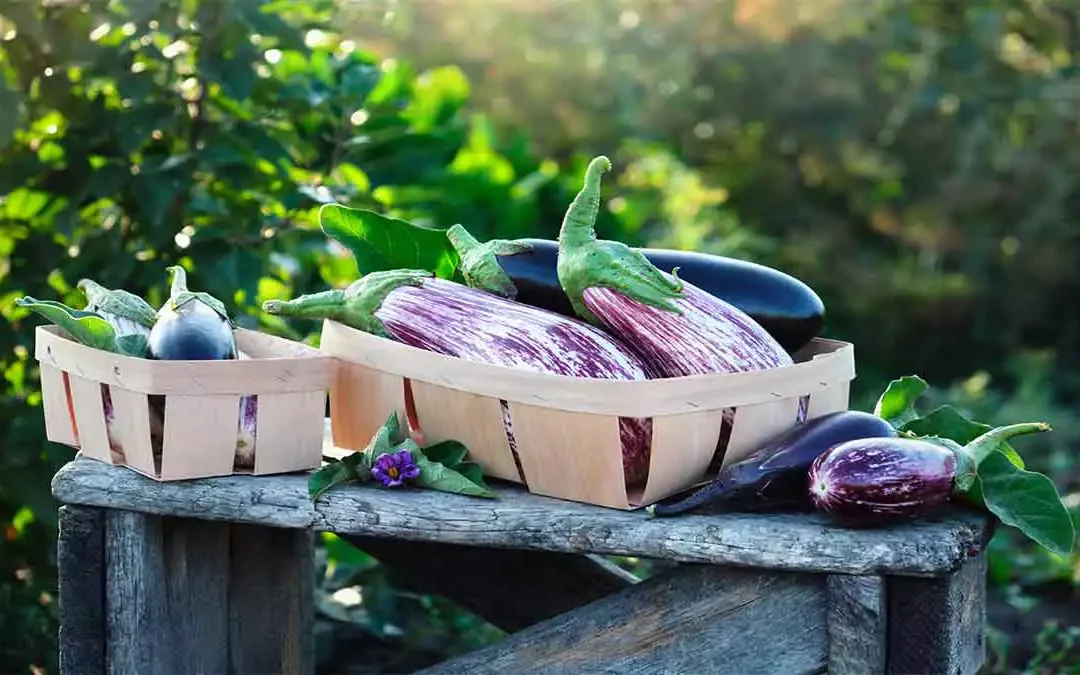Unlock the secrets to a thriving eggplant garden with the power of companion planting! This science-backed technique involves strategically planting complementary species alongside your eggplants to enhance growth, deter pests, and boost overall yield. By harnessing the natural interactions between plants, you can create a harmonious ecosystem that nurtures your eggplants and fosters a bountiful harvest. In this guide, we’ll delve into the best eggplant companion plants, supported by research, and provide expert tips for maximizing their benefits.
Top Eggplant Companion Plants
Companion planting can significantly benefit your eggplants by improving soil health, repelling pests, and enhancing growth. Here are some top companion plants for eggplants:
Eggplant Compaion Plants Flowers
Marigold (Tagetes spp.): The Aromatic Guardian
Marigolds emit a strong, pungent odor due to compounds like limonene and alpha-terthienyl, which naturally repel numerous pests that target eggplants, such as nematodes, whiteflies, and aphids. Studies in the Journal of Chemical Ecology have demonstrated the effectiveness of marigold volatiles in deterring these pests, reducing their populations significantly.
Spacing: Plant marigolds 12-18 inches apart throughout the eggplant bed, creating a protective barrier against pests.
Nasturtiums (Tropaeolum majus): The Sacrificial Decoy
Nasturtiums produce a chemical called glucosinolates, which attract aphids, effectively drawing them away from eggplants. This “trap cropping” technique minimizes damage to the main crop while supporting beneficial insects that prey on aphids. Research in the journal Biological Control has shown the efficacy of nasturtiums in reducing aphid populations on nearby crops.
Spacing: Plant nasturtiums 12-18 inches apart in a sunny spot near your eggplants.
Borage (Borago officinalis): The Bee’s Banquet
Borage’s beautiful blue flowers are a magnet for bees and other pollinators, ensuring your eggplants get the attention they need for optimal fruit production.
Spacing: Plant borage near the edges of your eggplant bed to avoid shading the eggplants.
RELATED: Borage Companion Plants
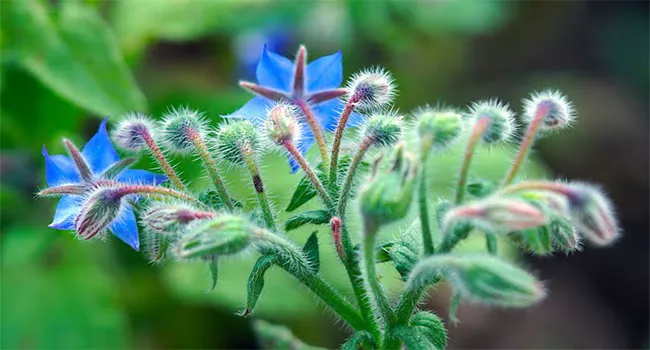
Eggplant Compaion Plants Herbs
Basil (Ocimum basilicum): The Fragrant Defender
Basil’s strong scent, rich in compounds like linalool and methyl chavicol, deters common eggplant pests like aphids, spider mites, and thrips. These pests are not only detrimental to eggplant health but can also transmit viral diseases. Companion planting with basil offers a natural and effective way to protect eggplants without resorting to chemical pesticides. A study published in the Journal of Economic Entomology found that intercropping basil with eggplants reduced aphid populations by up to 50%.
Spacing: Plant eggplants 18-24 inches apart, depending on the variety. Interplant basil seedlings or transplants 12 inches apart between eggplant plants.
Garlic (Allium sativum): The Pungent Protector
Garlic releases sulfur compounds like allicin, known for their potent antimicrobial and insecticidal properties. These compounds effectively repel various pests, including spider mites, aphids, and even larger animals like rabbits. Research published in the Journal of Agricultural and Food Chemistry has confirmed the efficacy of garlic extracts in pest management.
Spacing: Plant garlic cloves 4-6 inches apart and 2-3 inches deep in the fall for a spring/summer harvest, interspersing them among the eggplants.
Catnip (Nepeta cataria): The Flea Beetle Foe
Catnip produces nepetalactone, a compound that repels flea beetles, a common eggplant pest. It also attracts beneficial insects like parasitic wasps that help control other pests.
Spacing: Plant catnip 1-2 feet apart around the perimeter of your eggplant bed or in containers to prevent it from spreading too much.
Oregano (Origanum vulgare): The Aromatic Pest Deterrent
Oregano’s pungent aroma, containing compounds like carvacrol and thymol, deters aphids and spider mites, making it a valuable companion for eggplants.
Spacing: Plant oregano in clumps around the base of your eggplants or intersperse it throughout the bed.
Parsley (Petroselinum crispum): The Hoverfly Haven
Parsley attracts hoverflies, whose larvae are voracious predators of aphids and other small pests that can damage eggplants.
Spacing: Sow parsley seeds or transplant seedlings around the base of your eggplants, allowing 12-18 inches between plants.
Thyme (Thymus vulgaris): The Aromatic Protector
Thyme’s fragrant leaves, rich in essential oils, deter cabbage worms and whiteflies, protecting your eggplants from damage.
Spacing: Plant thyme as a living mulch around your eggplants to suppress weeds and deter pests simultaneously.
Dill (Anethum graveolens): The Beneficial Insect Beacon
Dill attracts beneficial insects like parasitic wasps and hoverflies, which prey on common eggplant pests.
Spacing: Allow dill to flower to attract these beneficial insects, and space plants 12-18 inches apart.

Eggplant Compaion Plants Vegetables
Beans (Phaseolus vulgaris): The Nitrogen Powerhouse
Beans, packed with nitrogen-fixing bacteria in their root nodules, naturally enrich the soil with this essential nutrient for eggplant growth. This symbiotic relationship means healthier, more robust eggplants with increased fruit production. Research from the Journal of Plant Nutrition and Soil Science shows that intercropping beans with eggplants can increase nitrogen availability by up to 30%.
Spacing: Plant bush beans 6-8 inches apart, leaving 2-3 feet between rows. For pole beans, provide sturdy trellises and space them 12-18 inches apart from the eggplants.
Peas (Pisum sativum): The Early Season Nitrogen Boost
Like beans, peas are nitrogen-fixing powerhouses that enrich the soil, giving eggplants a head start on growth. Their quick maturation allows them to be harvested before competing with eggplants for resources.
Spacing: Sow peas in early spring, 2-3 weeks before planting eggplants. Space them 2-3 inches apart, leaving 2-3 feet between rows.
Spinach (Spinacia oleracea): The Shade-Loving Nutrient Booster
Spinach thrives in the partial shade provided by eggplants, and its shallow roots won’t compete with eggplants for nutrients. Plus, spinach is a nutrient-dense addition to your diet. Research published in the journal Scientia Horticulturae found that shading spinach plants during hot weather can significantly increase their yield and delay bolting.
Spacing: Sow spinach seeds directly around your eggplants in early spring, spacing them 4-6 inches apart.
Radishes (Raphanus sativus var. radicula): The Rapid-Growing Pest Deterrent
Radishes mature quickly, allowing for harvest before they can compete with eggplants for resources. Additionally, their peppery roots may help deter some pests. A study published in the journal PLOS ONE found that radish root exudates can suppress the growth of certain soil-borne pathogens.
Spacing: Sow radish seeds directly around your eggplants in early spring, spacing them 1-2 inches apart.
RELATED: Peas Companion Plants
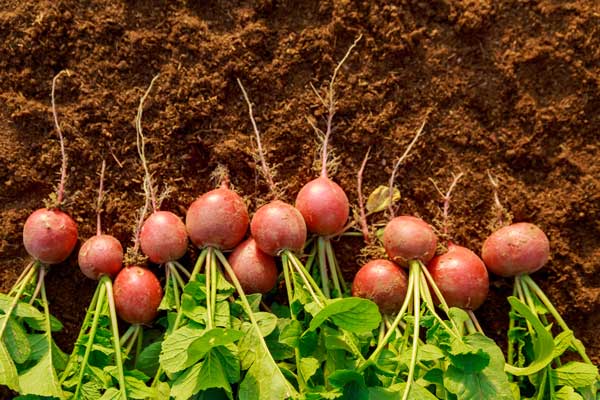
What Not to Plant with Eggplant
While companion planting can enhance garden health and productivity, choosing the wrong companions for eggplants can have adverse effects. Avoid planting fennel, as it releases growth-inhibiting chemicals into the soil. Keep corn away, as it shares pests with eggplants, like corn earworms and beetles. Potatoes and tomatoes, both nightshades, share diseases with eggplants and can lead to increased competition for nutrients and disease spread. Avoid planting eggplants near black walnut trees due to the toxic juglone chemical they produce. Brassicas, including cabbage, broccoli, and cauliflower, can attract pests and compete for nutrients, reducing eggplant yields. Dill, though beneficial for some plants, can inhibit the growth of nightshades if planted too close. To ensure strong, healthy eggplants, avoid these bad companions, plan your garden layout carefully, and practice crop rotation.
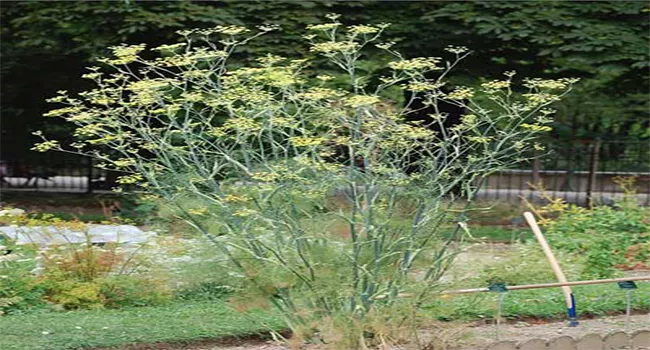
Planting and Care Tips for Eggplant Companion Plants
Choosing Your Plant Posse
Selecting the right companion plants for eggplant involves considering several factors: growth habits, light requirements, and pest-repelling properties. By thoughtfully choosing companions, you can create a harmonious garden that supports healthy plant growth and reduces the need for chemical interventions.
- Growth Habits: Look for plants with complementary growth habits. For example, tall plants can provide shade for those that prefer partial sun, while ground covers can help retain soil moisture and suppress weeds.
- Light Requirements: Ensure that all plants in your garden bed have similar light needs. Eggplants thrive in full sun, so pair them with other sun-loving plants.
- Pest-Repelling Properties: Some plants can deter pests that commonly attack eggplants. For instance, marigolds repel nematodes, while basil can help ward off aphids and tomato hornworms.
Garden Bed Blueprint
Proper spacing is crucial for optimal plant growth. Crowded plants compete for nutrients, water, and light, leading to stunted growth and increased susceptibility to disease.
- Spacing: Space eggplants 18-24 inches apart in rows that are 24-36 inches apart. Adjust the spacing for companion plants based on their mature size.
- Light Needs: Ensure taller plants do not overshadow shorter ones. Plant sun-loving companions like peppers and tomatoes alongside eggplants, while placing shorter herbs like basil and thyme around the edges.
Sketch a garden layout before planting. This visual plan helps you organize plant placement, ensuring adequate space and light for each plant. Include notes on plant heights and expected growth patterns to avoid future overcrowding.
Maintaining Your Garden Paradise
Consistent care is essential for a thriving garden. By focusing on watering, weeding, and organic pest control, you can maintain a healthy environment for your eggplants and their companions.
- Watering: Provide regular, deep watering to encourage strong root systems. Mulch around plants to retain moisture and reduce the frequency of watering.
- Weeding: Keep your garden free of weeds to prevent competition for resources. Use mulch to suppress weed growth and make weeding easier.
- Organic Pest Control: Use insecticidal soap or neem oil to control pests naturally. Companion plants can also play a significant role in pest management by attracting beneficial insects and repelling harmful ones.
Companion plants create a balanced ecosystem, reducing the need for harsh chemicals. For example, planting flowers like nasturtiums can attract predatory insects that feed on common eggplant pests.
By following these actionable steps, you can successfully implement companion planting in your garden. Thoughtful plant selection, proper spacing, and diligent maintenance will ensure a bountiful harvest and a beautiful, thriving garden
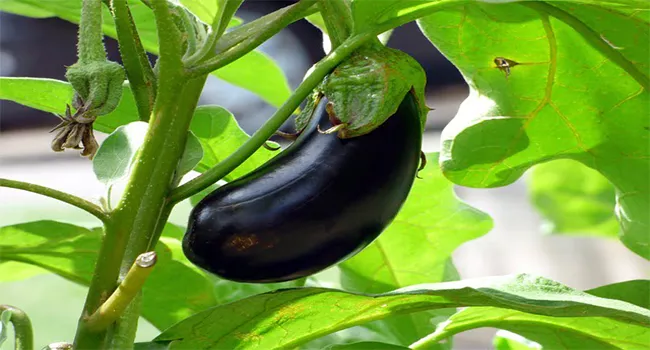
FAQ: Eggplant Companion Plants
Q: What should I plant with eggplant?
A: Ideal companions for eggplant include marigolds, basil, thyme, beans, and peppers. These plants can enhance growth and repel pests.
Q: What should I not plant with eggplant?
A: Avoid planting fennel, corn, potatoes, tomatoes, black walnut trees, brassicas (such as cabbage, broccoli, and cauliflower), and dill near eggplants due to competition, pest attraction, and growth inhibition.
Q: What are good companion plants for eggplant in containers?
A: In containers, eggplants pair well with basil, marigolds, and thyme, which can all help deter pests and do not compete for resources.
Q: What grows well with eggplant?
A: Eggplants grow well with herbs like basil and thyme, as well as with peppers, beans, and marigolds.
Q: Can I plant tomatoes and eggplants together?
A: It’s generally best to avoid planting tomatoes and eggplants together due to their susceptibility to the same pests and diseases. If you must plant them together, ensure proper spacing and implement crop rotation.
Q: Can you plant eggplant and peppers together?
A: Yes, eggplants and peppers can be planted together as they share similar growing conditions and can benefit from each other’s pest-repelling properties.
Q: Are zucchini and eggplant companion plants?
A: It’s best to avoid planting zucchini and eggplants together because both plants require a lot of space and nutrients, leading to competition.
Q: What should I plant next to eggplant?
A: Planting basil, thyme, marigolds, beans, and peppers next to eggplant can enhance growth and deter pests.
Q: Are onions and eggplant companion plants?
A: Onions can be good companions for eggplants as they help repel pests and do not compete for resources.
Q: Are squash and eggplant companion plants?
A: It is better to avoid planting squash and eggplant together due to their high nutrient needs and potential for competition.
Q: What companion plants go well with eggplant?
A: Good companion plants for eggplant include marigolds, basil, thyme, beans, peppers, and onions.
Q: Are peppers and eggplant companion plants?
A: Yes, peppers and eggplant are good companion plants as they have similar growing requirements and can help protect each other from pests.
Q: Are kale and eggplant companion plants?
A: Kale can be grown near eggplant, but keep an eye on potential pest issues and ensure both plants have enough space and nutrients.
Q: Are Ichiban eggplants different when choosing companion plants?
A: No, Ichiban eggplants have the same companion planting needs as other eggplant varieties. Good companions include marigolds, basil, thyme, beans, peppers, and onions.
Q: Are Japanese eggplants different when choosing companion plants?
A: No, Japanese eggplants have the same companion planting requirements as other eggplant types. Suitable companions are marigolds, basil, thyme, beans, peppers, and onions.
Conclusion
Companion planting with eggplants offers numerous benefits, including enhanced yield, effective pest control, and improved overall garden health. By carefully selecting and positioning companion plants like marigolds, basil, thyme, beans, and peppers, you create a balanced ecosystem that supports robust growth and reduces the need for chemical interventions.
Experiment with companion planting in your garden and experience the transformation in your eggplant harvest. Witness the increased productivity, natural pest management, and healthier plants that result from this thoughtful gardening approach.
Companion planting can also enhance the flavor and quality of your homegrown eggplants, making your garden bounty even more enjoyable.
By implementing these strategies, you can create a thriving, healthy garden full of vibrant eggplants and their beneficial companions. Start exploring the world of eggplant companion plants today for a more productive and sustainable gardening experience.

